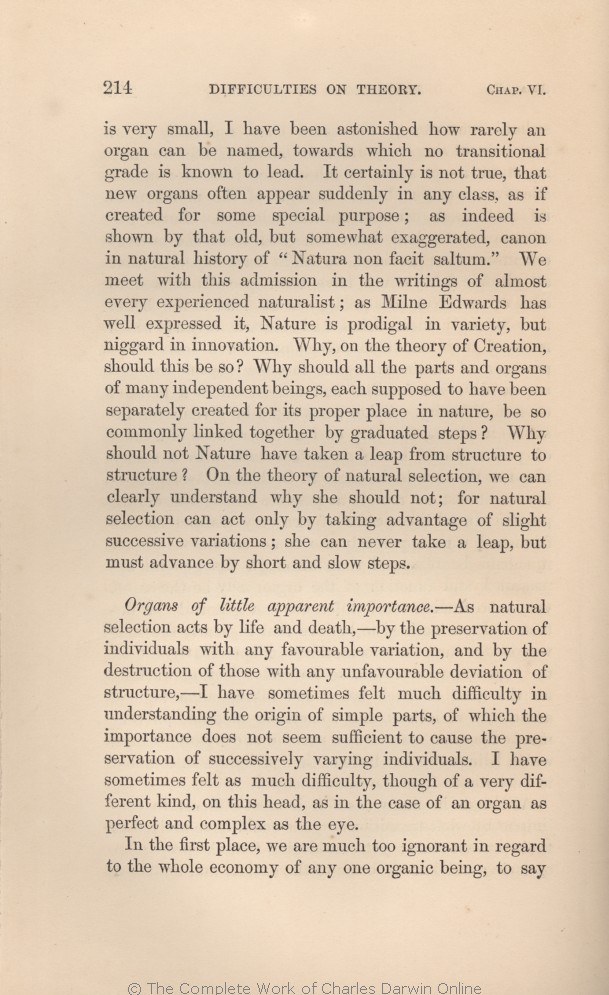is very small, | is very small, 1859 1860 1861 |
| is very small 1866 |
| OMIT 1869 1872 |
| I 1859 1860 1861 1869 1872 |
| compared with the extinct and unknown forms, I 1866 |
| It certainly is not true, that new organs often appear suddenly in any class, as if created for some special purpose; as indeed is 1861 |
| The truth of this remark is indeed 1859 1860 |
| It certainly is true, that new organs very rarely or never suddenly appear in any class, as if created for some special purpose; as indeed is 1866 |
| It certainly is true, that new organs appearing as if specially created for some purpose, rarely or never appear suddenly in any class; as indeed is 1869 |
| It certainly is true, that new organs appearing as if created for some special purpose, rarely or never appear in any being;— as indeed is 1872 |
| old, 1861 1866 1869 1872 | | old 1859 1860 |
| but somewhat exaggerated, canon 1861 1866 1869 1872 |
| canon 1859 |
| but somewhat exaggerated canon 1860 |
| ..... 1861 1866 | | or, 1859 1860 | | or 1869 1872 |
| Nature 1860 1861 1866 1869 1872 | | nature 1859 |
| this 1859 1860 1861 | | there 1866 1869 1872 |
| so? 1859 1860 1861 |
| so much variety and so little novelty? 1866 1869 |
| so much variety and so little real novelty? 1872 |
| commonly 1860 1861 1866 1869 1872 | | invariably 1859 |
| have 1859 1860 1861 | have 1866 1869 1872 |
| taken 1859 1860 1861 | | take 1866 1869 1872 |
| leap 1859 1860 1861 | | sudden leap 1866 1869 1872 |
| can 1859 1860 1861 | can 1866 1869 1872 |
| act 1859 1860 1861 | | acts 1866 1869 1872 |
| leap, 1859 1860 1861 |
| sudden leap, 1866 1869 |
| great and sudden leap, 1872 |
| short and slow 1861 |
| the shortest and slowest 1859 1860 |
| short and sure though slow 1866 1869 |
| short and sure, though slow 1872 |
|
Organs
|
Organs
1859 1860 1861 | |
Organs
1866 1869 1872 |
|
of
1859 1860 1861 | |
of
1866 1869 1872 |
|
little
1859 1860 1861 | |
little
1866 1869 1872 |
|
apparent
1859 1860 1861 | |
apparent
1866 1869 1872 |
|
importance
.—
1859 1860 1861 |
|
Importance, as affected by Natural Selection. 1866 |
|
Importance, as affected by Natural Selection. 1869 |
|
Importance, as affected by Natural Selection
. 1872 |
|
As natural selection acts by life and
death,— | death,— 1859 1860 1861 1872 | | death,—by 1866 1869 |
| by 1859 1860 1861 1872 | by 1866 1869 |
| preservation 1859 1860 1861 1866 | | survival 1869 1872 |
| individuals with any favourable variation, 1859 1860 1861 1866 |
| the fittest, 1869 1872 |
| those with any unfavourable deviation of structure,— I have sometimes felt much difficulty in understanding the origin of simple parts, of which the importance does not seem sufficient to cause the preservation of successively varying individuals. 1859 1860 1861 |
| those with any unfavourable deviation of structure,—I have sometimes felt much difficulty in understanding the origin of simple parts, of which the importance does not seem sufficient to cause the preservation of successively varying individuals. 1866 |
| the less well fitted individuals,—I have sometimes felt great difficulty in understanding the origin or formation of parts of little importance; almost as great, though of a very different kind, as in the case of the most perfect and complex organs. 1869 |
| the less well-fitted individuals, 1872 |
| I 1859 1860 1861 1866 | | — I 1872 |
| as much difficulty, 1859 1860 1861 1866 |
| great difficulty in understanding the origin or formation of parts of little importance; almost as great, 1872 |
| on this head, 1859 1860 1861 1866 |
| OMIT 1872 |
| an organ as 1859 1860 1861 1866 |
| the most 1872 |
| as the eye. 1859 1860 1861 1866 |
| organs. 1872 |
|
|
| In the first place, we are much too ignorant in regard to the whole economy of any one organic being, to say
|









